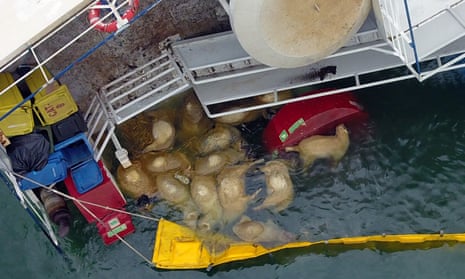Romania has been accused of “complete silence” over its investigation into the sinking of the Queen Hind last November, which resulted in the deaths of more than 14,000 sheep.
Rescuers who rushed to the sinking Queen Hind vessel, which left Romania’s Black Sea port of Midia a year ago, managed to save just 228 sheep out of a total 14,600, but only 180 ultimately survived the ordeal.
Romania’s prime minister Ludovic Orban vowed on television last year to end live exports in the “medium-term”. However, since the Queen Hind disaster more than 2 million live animals have been exported from Romania – mostly to north Africa and the Middle East.
Romanian authorities have claimed the vessel was 10% below capacity and that the animals were “clinically healthy and fit for transport”. But campaigners say the vessel was overloaded and this ultimately led to the thousands of sheep drowning in the Black Sea.
The only information to emerge since the sinking has been the discovery of secret compartments onboard with dead animals inside, by the company hired to remove the ship from the water.
Romania’s transport ministry told the Guardian this week that investigations are concluded and said a summary of the report will be published on the ministry’s website. They also said that the purpose of the technical investigation was to establish maritime safety issues and to prevent future accidents, and “not to establish guilt in people involved”.
EU law stipulates that investigations into maritime accidents should be reported in full within 12 months, but that if a final report is not possible in that timeframe, then “an interim report shall be published within 12 months of the date” of the event.
“They promised a cross-check investigation to find out what happened, and since then – complete silence,” said Gabriel Paun, EU director at Animals International.
The Guardian contacted MGM Marine Shipping, the management company behind the Queen Hind, and they denied any knowledge of secret decks. They said company procedures hadn’t changed since the disaster.
“Nothing has changed, I don’t want to talk any more about this vessel – I want to forget about it,” a company representative said in a telephone call before hanging up.
A European commission audit on Romania between September and October last year, which aimed to evaluate animal welfare during transport by livestock vessels to non-EU countries, raised multiple concerns, including “a general lack of records in the system of controls to ensure animal welfare during transport by sea to non-EU countries”.
“There is no evidence of checks confirming that the animals are fit to continue the journey. The absence of documented procedures, records and support to official veterinarians in checking vessels provide little assurances on the effectiveness of most controls carried out,” the report said.
“The Queen Hind was an iconic example of the intrinsic failures of the system,” said Reineke Hameleers, CEO of Brussels-based Eurogroup for Animals, an EU umbrella group for animal advocacy organisations. “The EU likes to pride itself as a global animal welfare leader, but it still makes its hands dirty with this cruel industry.”
A Guardian investigation found that livestock vessels are twice as likely to suffer a “total loss” from sinking or grounding as standard cargo vessels. Livestock ships are often old and originally built for other purposes before being converted to carry animals. The Queen Hind was 39 years old at the time of the disaster.
Mary Pana, president of the association of cattle, sheep and pig breeders and exporters in Romania, said: “EU competition with Australia and New Zealand is acute.”
“Naval accidents have happened to us and to them. But these are accidents … I trust the EC [European commission] will find an efficient way to change the current legislation so that the animals have superior welfare conditions for breeding, transport, and slaughter,” Pana said.
Campaigners have complained that since the disaster little has changed to improve animal welfare standards for live exports.
“These are not five-star cruises,” said Paun. “I’ve spent time on cargo ships and conditions cannot be improved – there are always an enormous amount of problems that occur, and there is not one single [long-haul] shipment where there are no animals dying.”
Vasile Deac, a veterinarian and owner of a live export company, said a ban on live exports would harm the livelihoods of Romanian farmers.
“The live animal export trade is very important for Romanian farmers,” Deac said. “If there was no live export market farmers wouldn’t have anywhere to sell their animals and it would be a big loss for them.”
“As an exporter it’s very important for me to see the ships that the animals are exported on,” he said. “The Queen Hind was an accident, it wasn’t done intentionally.”
Sign up for the Animals farmed monthly update to get a roundup of the best farming and food stories across the world and keep up with our investigations. You can send us your stories and thoughts at animalsfarmed@theguardian.com
